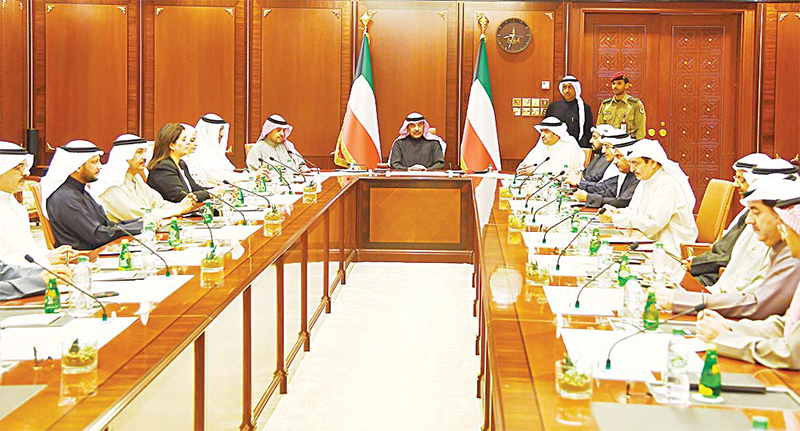09/03/2020
09/03/2020
HH PM and concerned ministers to attend today’s meeting

KUWAIT CITY, March 9: National Assembly Speaker Marzouq Al- Ghanim disclosed that the Assembly Office will hold a meeting at 12:30 pm on Tuesday to discuss decisions and procedures taken by the government regarding coronavirus, with HH the Prime Minister Sheikh Sabah Al- Khaled Al-Sabah and concerned ministers in attendance. He affirmed the MPs are free to attend the meeting, clarifying this replaces the cancelled session on coronavirus which was supposed to be held on the same day.
He said items in the agenda for the meeting include responses of the government to various questions on coronavirus. He also confirmed the Assembly’s commitment to the recommendations issued by the Ministry of Health (MoH) and World Health Organization (WHO). He then thanked the medical and technical teams in different institutions for the efforts they are exerting in dealing with coronavirus.
Meanwhile, MPs Safa’a Al- Hashem, Muhammad Al-Dallal, Omar Al-Tabtabaei, Abdullah Al-Kandari and Al-Humaidi Al- Subai’e submitted a bill amending law number 8/1969 on medical precautionary measures and infectious diseases.
The bill stipulates replacing Article 15 of the above-mentioned law to be as follows: A supreme health council is formed according to the decision of the Council of Ministers in case of an epidemic or spread of an infectious disease locally, regionally or globally.
The council is headed by the health minister, with other concerned ministers and senior officials as members. Whoever violates the relevant decisions will be deported immediately and permanently banned from entering Kuwait.
The council is granted special powers to carry out the following:
■ Determine infected and potentially hazardous areas,
■ Take decisions aimed at protecting the country,
■ Ask for assistance from Kuwait Army to enforce its decisions if the need arises,
■ Ask the Ministry of Interior to impose travel ban and control the entry and exit of individuals and shipment through land, sea and air borders,
■ Enforce medical checkup and quarantine procedures on expatriates holding valid residency permits who enter Kuwait from their home countries,
■ Specify the quarantine period,
■ Specify the required medical equipment and medicines, while ensuring the local market has ample supply of such items,
■ Coordinate with the Ministry of Education and Higher Education in organizing closure of academic institutions for various educational stages,
■ Ask the Cabinet to suspend public activities in different fields like sports, social and religious events,
■ Recommend suspension of work in public institutions and refer recommendations to the Cabinet for the latter to take decision,
■ Authorize doctors, paramedics and medical teams to enter houses to search for infected individuals anytime and take the necessary procedures including compulsory quarantine,
■ Coordinate with other concerned public institutions like Kuwait Municipality and Ministry of Commerce and Industry in disposing infected foodstuff, sterilizing infected commodities such as clothes and furniture, and deporting sellers or vendors if necessary.
On the other hand, MP Dr Bader Al-Mullah called on the government to address the negative economic consequences of the major loss incurred by Boursa Kuwait.
the Capital Markets Authority (CMA) should activate Article 44 of the CMA Law, which stipulates suspension of trading for a certain period that can be extended if necessary.
He added the regional and global circumstances have negatively affected the Kuwaiti market. He asked the Central Bank of Kuwait (CBK) to issue circulars on protecting debtors, considering a big number of traders and shareholders at Boursa Kuwait provided their shares as credit to Kuwaiti banks.
Consequently, the decline of the value of shares means reduction of credit amount, he asserted. He urged the government to draft a new public budget in light of the dramatic oil price decline, taking into consideration the expenditures and neutral oil prices.
He appealed to the private sector to shoulder its social responsibility, pointing out that many Kuwaiti youths obtained loans from Kuwait National Fund for Small and Medium Enterprises and they are badly affected by the steep market decline.
He also emphasized the need to verify assets and sources of Sovereignty Fund. In addition, he stressed the importance of establishing a crisis management institution as it is needed urgently to deal with difficult circumstances. “We need a government with the ability to foresee crises and take the necessary procedures to protect the society,” he concluded


